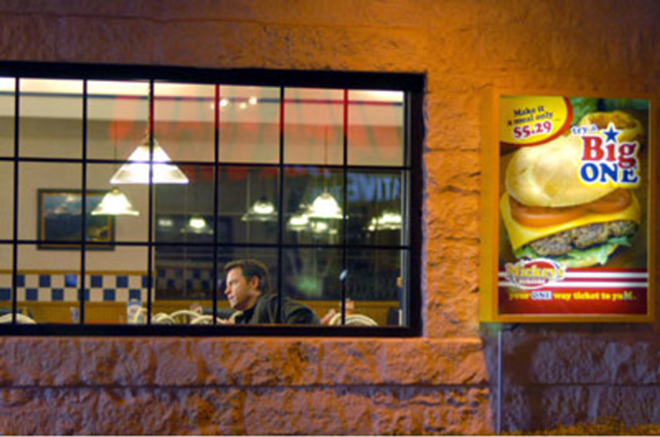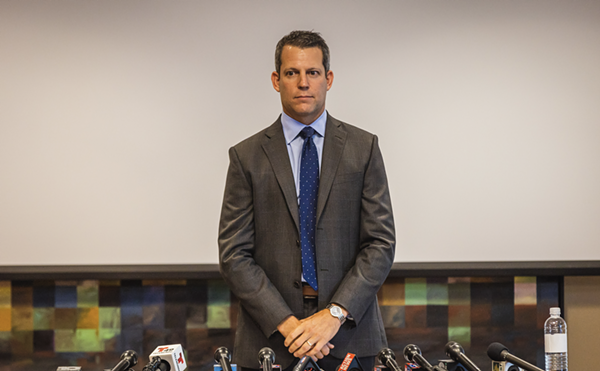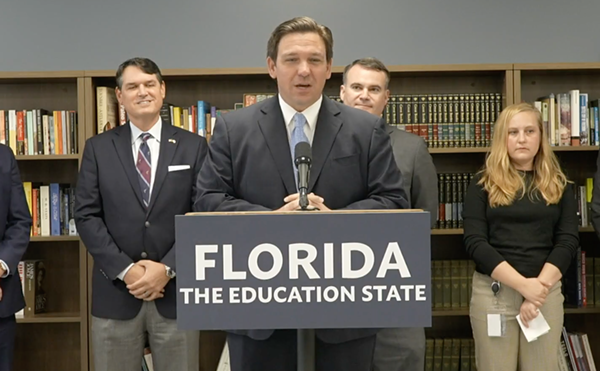
The money shot in Richard Linklater's Fast Food Nation doesn't turn up until the movie is nearly over, but it's nasty enough to put even the most hardcore carnivores off their game. For nearly two hours, the movie teases us with tales of the killing floor, and there it finally is in all its awful glory — the rows upon rows of headless animal carcasses hanging on hooks, the miles of guts oozing their way up and down gore-soaked conveyor belts, the "technicians" wading knee-deep in pools of blood rushing in faster than the industrial-sized drains can handle.
There's more, too, but I'm sure you get the picture. The local preview audience of Fast Food Nation included a smattering of pale, earnest-looking vegans (there at the invitation of the studio, along with the usual assortment of balding, middle-aged film critics) — and by the time those massive ropes of steaming cow intestines were exploding all over the screen, I could swear I heard more than a few gentle, sandal-clad souls fainting dead away in the dark.
Unfortunately, that's about as good — or, depending on how you look at it, as bad — as it gets. There's nothing else in Fast Food Nation that comes close to matching the impact of that single, visceral sequence, and the movie's take on the wages of junk food is ultimately a pretty tepid one.
Dietary activists are likely to find the film a very minor footnote to Morgan Spurlock's Super Size Me, rather than an amplification of Spurlock's enthusiastic agitprop. Cineastes and fans of Linklater's impressively eclectic oeuvre are equally likely to be disappointed with a film that, when you get right down to it, just isn't very meaty.
A filmmaker who rarely repeats himself and even more rarely makes a foolish move, Linklater has effortlessly segued from cerebral experimentation (Waking Life) to sensitive romance (Before Sunset, Before Sunrise) to goofball comedy (Dazed and Confused) to apocalyptic sci-fi (A Scanner Darkly), often incorporating elements of everything in a single swoop. Fast Food Nation is something else again, but it's probably not something we'll see featured prominently on the director's resume in years to come.
Opening on an all-American family contentedly scarfing down burgers in a fabricated fast food chain unsubtly dubbed "Mickey's," Fast Food Nation gets right down to business, zeroing in on a meat wafer waiting for communion with its happy consumer. Linklater's camera zooms past the bun and right into the patty for some food porn of the most obscene sort, magnifying pools of grease, gristle and other curious materials probably best left unconsidered. The meat is scary, no way around it, and it's our gateway to everything that follows.
Working from a script by Eric Schlosser, who wrote the 2001 bestseller on which Fast Food Nation is based, Linklater gives us several seemingly unrelated characters and then, shades of Short Cuts and all things Babel-like, cuts between them. At the risk of overkill with the name-dropping, the film also inevitably evokes Steven Soderbergh's Traffic, with action taking place on both sides of the Mexican-American border and with principal characters coming from the ranks of the privileged few as well as the armies of illegals living the uglier side of the American Dream.
Linklater and Schlosser go through the motions of keeping us guessing for an unseemly amount of time, and when the revelations come, they're not all that revealing. What connects all of the movie's characters is, of course, the meat. Greg Kinnear plays a marketing director on a fact-finding mission to discover how so much cow manure is getting into Mickey's beef (this being the nominal mystery driving this curiously shapeless film).
Several of the high school kids that the movie introduces us to turn out to be Mickey's fry cooks and low-level grunts with dreams of rebellion (that don't particularly come to much). And the vast majority of the illegal immigrants that the movie follows wind up working in a massive meat-packing plant where it's a toss-up what's more horrific: the working conditions or the process by which the meat transforms from cow to shrink-wrapped parcel on our supermarket shelves.
Linklater cuts between the various characters in a blithely scattershot way that worked fine in Slacker but that seems weirdly out of place and overly relaxed here, sometimes to the point of trivializing the movie's ability to function as a serious social critique. It's almost as if Linklater, a natural born subversive eager to keep his enormously serious subject from appearing too dry, is subconsciously crafting a film at odds with itself. Characters float in and out of the proceedings with disconcerting randomness (Kinnear actually seems to be the star here until he simply disappears altogether at the midpoint) and, even more bewildering, most of these characters come off as curiously underdeveloped, basic sketches barely come to life.
Most of Fast Food Nation's performances seem almost faceless, but then, inexplicably, Linklater gives us a sprinkling of what are basically celebrity cameos, so outsized and incongruous with the movie's understated reality that they jar us right out of it. At various points, Avril Lavigne, Kris Kristofferson, Ethan Hawke and Patricia Arquette, all pretending to be people other than the famous stars they really are, show up to share a scene or two with a cast of relative unknowns. Bruce Willis fares a little better, delivering a single monologue that actually engages us enough to make us forget who he is. "We all have to eat a little shit from time to time," Willis smirks, providing rare insight into the fast food industry vis-à-vis the film's defining line.
Fast Food Nation doesn't really hold together that well as a movie, but it does at least make a moderately interesting companion piece to Linklater's A Scanner Darkly — a howl, however inarticulate, at a contemporary reality that's a direct precursor to Scanner's future dystopia. At root, both films send up a selfish, de-personalized consumer culture where the faster we go, the less we understand.
Linklater rambles way too much in Fast Food Nation, but at least he makes his points without getting preachy, letting us know that everyone we see on screen (and, by implication, ourselves) are all cogs in the great and terrible wheel of supply and demand.
It should have been funnier and feistier, but Fast Food Nation is worth a look, if only for that. Linklater's choicest irony is that even those raging against the machine can't help becoming part of its process — as in the movie's best joke, where a bunch of activists stand around screaming at the cows they're attempting to liberate. "Stupid cows," huffs one demonstrator, as the animals stare blankly at the hole that's been helpfully cut in their fence. "Next time we should bring cattle prods."
It's a good gag, but the implication is we're just like those paralyzed bovines — too dumb to do anything but wallow in our own waste and wait for the inevitable slaughter. That's the killing joke, of course, and if Fast Food Nation had a few more like it, this could have been a contender.

















